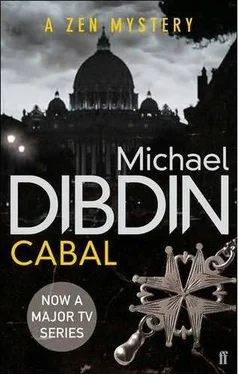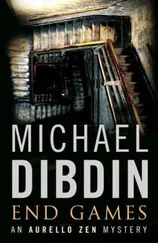Michael Dibdin - Cabal
Здесь есть возможность читать онлайн «Michael Dibdin - Cabal» весь текст электронной книги совершенно бесплатно (целиком полную версию без сокращений). В некоторых случаях можно слушать аудио, скачать через торрент в формате fb2 и присутствует краткое содержание. Жанр: Полицейский детектив, на английском языке. Описание произведения, (предисловие) а так же отзывы посетителей доступны на портале библиотеки ЛибКат.
- Название:Cabal
- Автор:
- Жанр:
- Год:неизвестен
- ISBN:нет данных
- Рейтинг книги:5 / 5. Голосов: 1
-
Избранное:Добавить в избранное
- Отзывы:
-
Ваша оценка:
- 100
- 1
- 2
- 3
- 4
- 5
Cabal: краткое содержание, описание и аннотация
Предлагаем к чтению аннотацию, описание, краткое содержание или предисловие (зависит от того, что написал сам автор книги «Cabal»). Если вы не нашли необходимую информацию о книге — напишите в комментариях, мы постараемся отыскать её.
Cabal — читать онлайн бесплатно полную книгу (весь текст) целиком
Ниже представлен текст книги, разбитый по страницам. Система сохранения места последней прочитанной страницы, позволяет с удобством читать онлайн бесплатно книгу «Cabal», без необходимости каждый раз заново искать на чём Вы остановились. Поставьте закладку, и сможете в любой момент перейти на страницу, на которой закончили чтение.
Интервал:
Закладка:
Simonelli tugged at the briefcase again, more insistently this time. Zen held on tight.
‘How do I know I’ll get paid?’
‘Of course you’ll get paid! No one can get off the train until we reach Bologna anyway.’
As the train glided through the station of Vernio and entered the southern end of the long tunnel under the Apennines, Zen’s attention was momentarily distracted by the woman who had caused such a stir at the terminus in Rome. She was making her way to the front of the carriage, and once again he only saw her clothes, a cowlneck ribbed sweater and tightly cut skirt. She left a subtle trail of perfume behind her, as though shaken from shoulder-length blonde hair like incense from a censer.
‘If the transcript is safe with you, the money is safe with me,’ Zen found himself saying above the roaring of the tunnel. ‘So give it to me now, before you take the transcript.’
He had hoped to disconcert Simonelli with this demand, to force him to consult his associate and thus give Zen more time to consider his next move. But as usual, he was a step behind. With a brief sigh of deprecation at this regrettable lack of trust on Zen’s part, Simonelli opened his briefcase. It was full of serried bundles of ten-thousand-lire notes.
‘Fifty million,’ the magistrate said. ‘As we agreed.’
He closed the lid and snapped the catches, locking the case, then stood up and laid it on his seat.
‘Now give me the transcript, please.’
Zen stared up at him. Why struggle? What difference did it make? He had been going to hand the transcript over to Simonelli anyway, in Milan. This way the result was the same, except that he came out of it fifty million lire better off. Even if he wanted to resist, there was nothing he could do, no effective action he could take. The only weapon he had was the fake revolver buried inside his suitcase in the luggage rack at the end of the next carriage. But even if he had been armed to the teeth, it wouldn’t have made any difference in the long run. The Cabal would get their way in the end. They always did.
He lifted his arm off his briefcase. Simonelli reached across, opened the briefcase and removed the transcript.
‘I shall be no more than five minutes,’ he said. ‘We have several men on the train. If you attempt to move from this seat during that time, I cannot be responsible for your safety.’
He strode off along the carriage towards the vestibule where the blonde woman was now smoking a cigarette. The train seemed to be full of masochistic smokers, Zen reflected with a forlorn attempt at humour. He stared out of the window, trying to think of something other than the humiliation he had just suffered. Although he had been travelling this line for years, the ten-and-a-half-minute transit of the Apennines was still something which awed him. His father had impressed the young Aurelio with the history of the epic project which had gripped the imagination of the nation throughout the twenties. Although marginally shorter than the Simplon, the Apennine tunnel had been infinitely more difficult and costly to construct, running as it did a nightmarish schist riddled with pockets of explosive gas and unmapped underground lakes which burst forth without warning, flooding the workings for months on end. Zen was lost in these memories and speculations when, just like the previous Friday, all the lights went out.
A moment later the secure warmth of the carriage was gutted by a roaring torrent of ice-cold air. The train shuddered violently as the brakes locked on. Cries of alarm and dismay filled the carriage, turning to screams of pain as the train jerked to a complete stop, throwing the passengers against each other and the seats in front.
Once Zen’s eyes had adjusted to the darkness, he discovered that it was not quite total after all. Although the lights in this carriage had failed, those in the adjoining coaches reflected off the walls of the tunnel, creating a faint glimmer by which he could just make out the aisle, the seats and the vague blurs of the other passengers moving about. Then two figures wielding torches like swords appeared at the end of the carriage. A moment later, the fluorescent strip on the ceiling of the carriage came on again.
It was a perfect moment for a murder, Zen reflected afterwards. The killers would be wearing sunglasses, and while everyone else was blinded by the sudden excess of light, they could carry out their assignment as though in total darkness. Fortunately, though, the men who had entered the carriage were not assassins but members of the train crew. Zen followed them to the vestibule at the front of the carriage, where he made himself known to the guard, a grey-haired man with the grooming and gravity of a senior executive.
The gale-force wind which had stripped all the warmth out of the carriage had diminished now the train had come to a halt, but there was still a vicious draught streaming in through the opened door. Zen asked what had happened. The capotreno indicated a red lever set in a recess in the wall near by. Shouting to make himself heard over the banshee whining in the tunnel outside, he explained that the external doors on the train were opened and closed by the driver, but that this mechanism could be overridden manually to prevent people being trapped inside in the event of an emergency. The lever was normally secured in the up position with a loop of string sealed like a mediaeval parchment with a circle of lead embossed with the emblem of the State Railways. This now dangled, broken, from its support.
‘As soon as this lever is thrown, a warning light comes on in the driver’s cab, and he stops the train. Unfortunately some people like to kill themselves this way. I don’t know why, but we get quite a few.’
Just like St Peter’s, thought Zen.
‘But why did the lights go off?’ he asked.
The guard indicated a double row of fuses and switches on the wall opposite, protected by a plastic cover which now swung loose on its hinges.
‘The fuse for the main lighting circuit was missing. We’ve swapped over the one for the air-conditioning thermostat, just to get the lights back on before the passengers started to panic. He must have done it himself, so he couldn’t see what was going to happen to him.’
The toilet door opened with a click and the blonde woman stepped out. She looked slightly flustered by so much male attention.
‘Has something happened?’ she asked.
Close to, her skin showed a slight roughness that made her seem older. Her pale blue eyes looked at Zen, who sniffed. Apart from her perfume, there seemed to be another new odour present — the smell of burning.
‘Did you hear anything?’ he said.
The flaxen hair trembled as she shook her head.
‘Just the roaring noise when the lights went out. Has someone…?’
The capotreno dismissed the woman with a wave and told two of his assistants to keep the passengers off the vestibule.
‘We’d better have a look on the track,’ he said.
The pendolino had never seemed more like an airplane to Aurelio Zen than when he stepped out of its lighted sanctuary into the howling storm outside. The Apennines form a continuous barrier running almost the entire length of the Italian peninsula, and the prevailing climatic conditions are often very different on either side. This man-made vent piercing the range thus forms a conduit for violent air currents flowing in one direction or the other as the contrasting weather systems try to find their level.
The high pressure was in Tuscany that day, so the wind was flowing north, battering the faces of the men as they walked back along the track. While they were still alongside the train, the lights streaming from the windows high overhead, Zen found the experience just about tolerable. But when they passed the final coach and struck out into the midst of that turbulent darkness which corroded the fragile beams of their torches, wearing them away, using them up, until they could hardly see the track in front of them, he was gripped by a terror so real it made anything else appear a flimsy dream of security, a collective delusion provoked by a reality too awful to be contemplated.
Читать дальшеИнтервал:
Закладка:
Похожие книги на «Cabal»
Представляем Вашему вниманию похожие книги на «Cabal» списком для выбора. Мы отобрали схожую по названию и смыслу литературу в надежде предоставить читателям больше вариантов отыскать новые, интересные, ещё непрочитанные произведения.
Обсуждение, отзывы о книге «Cabal» и просто собственные мнения читателей. Оставьте ваши комментарии, напишите, что Вы думаете о произведении, его смысле или главных героях. Укажите что конкретно понравилось, а что нет, и почему Вы так считаете.












